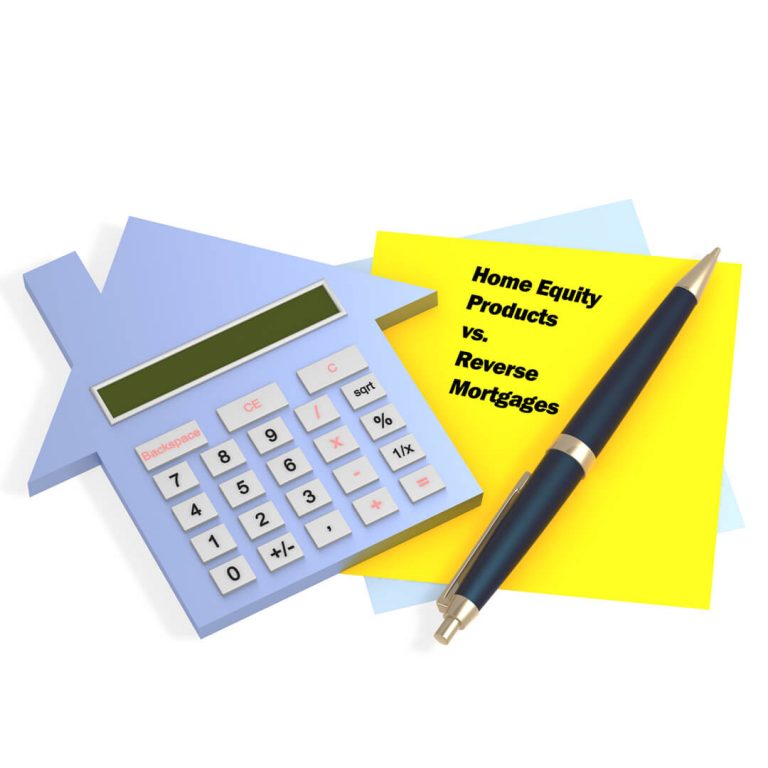If you’ve lived in your home for decades, your mortgage may be paid off, or nearly paid off. Over the years, the value of your home has also most likely increased significantly. That means you’ve quite possibly got tens of thousands (or maybe even hundreds of thousands) of dollars worth of equity in it. Equity is simply the difference between the current market value of a home and the amount owed on the mortgage (if any). Said another way, if the selling price for houses like yours in your area is $200,000 and you owe $100,000 on your mortgage, you have $100,000 worth of home equity.
The reality of this scenario, however, is that you’ve also got bills. Perhaps you’d like to make some upgrades and renovations to your home so that it’s easier to get around. Perhaps you are supporting your family and grandchildren. The needs can be endless.
Let’s look at some popular options for making use of all that equity.
Home Equity Lines of Credit (HELOCS) and Home Equity Loans
HELOCs and home equity loans let individuals borrow money based on the equity in their homes—typically at lower rates than credit cards and personal loans. For borrowers who want to use the money for various expenses over a period of time, a HELOC is probably the better choice. A HELOC is a revolving line of credit (as a credit card is), and you have a minimum monthly payment. Typically, you can get a HELOC for a maximum of anywhere from 80% to 100% of the equity in your home, up to a designated maximum dollar amount.
HELOCs have comparatively low interest rates for the first year. They are variable-rate products, so if the prime rate (set by the federal government and determines the interest rates charged by lenders across the country) increases, you’ll likely see your rate go up after that introductory period. However, that increase is limited (or capped) under the terms of the line of credit.
A home equity loan is a one-time loan, like a mortgage, rather than a line of credit. You get the amount in a lump sum. People may choose a home equity loan over a HELOC if they need the money for a single expense, like a large medical bill or something more pleasant, like a boat or a wedding. These are typically fixed-rate loans. As with HELOCs, the rates are usually lower than loans and lines of credit not secured by your home.
Both HELOCs and home equity loans are good options for older homeowners and anyone with a significant amount of equity in their home who would like to make use of that equity for unexpected expenses, big purchases or whatever they choose.
Reverse Mortgages
With a regular mortgage, you borrow money to buy a house and pay back the lender over time. With a reverse mortgage, the lender lets you borrow money based on the equity you’ve accumulated in the house and pays you back (minus interest). Essentially, the lender is giving you an advance on that equity.
You can get the funds as a single disbursement (like a home equity loan) or in payments over time (like a HELOC). Reverse mortgages with lump-sum payments tend to be fixed rate. If you choose to get payments over time, you likely will have a variable rate loan. The interest you’re charged on the mortgage is deducted from your payments.
Unlike HELOCs and home equity loans, reverse mortgages are only available to borrowers who are at least 62 years old. Also unlike HELOCs and home equity loans, which have a term of up to 30 years, the reverse mortgage doesn’t have to be paid back unless the borrower:
- chooses to sell the home
- hasn’t resided in the home for a year or longer (for example, if they move into an assisted living facility), or
- passes away.
All three of these scenarios typically involve the sale of the home. When the last borrower passes away, their estate will need to repay the mortgage. That usually involves selling the house.
There are several types of reverse mortgages, but most reverse mortgage borrowers get a Home Equity Conversion Mortgage (HECM), the only type of reverse mortgage insured by the federal government. If you apply for an HECM, you’re required to meet with a counselor from an independent housing counseling agency to make sure you understand the terms, upfront costs and ongoing fees (like annual mortgage insurance premiums).
Which Is Best for Me? A Home Equity Line/Loan or a Reverse Mortgage?
Only you can decide which type of product is best for you. However, it’s essential to remember some key differences between the two options:
- With HELOCs and home equity loans, you don’t “use up” your equity because you pay it back over time. That means if you choose to sell your home later to downsize, relocate to another area or because you need the care and support of an assisted living facility, nursing home or family, you’ll have more equity left with a HELOC or home equity loan than you would if you had a reverse mortgage, where you don’t repay the loan (unless, of course, you sell the home).
Similarly, if you plan to leave your home to your heirs or other beneficiaries, there will be less equity in it if you have a reverse mortgage than if you have a HELOC or home equity loan. There may be no equity left at all.
- With a reverse mortgage, you agree to stay current on your property taxes and homeowner’s insurance premiums and keep your home from falling into disrepair. If a borrower neglects to do any of those things, they could lose the home to foreclosure. The lender may require a “set aside” of those expenses. That reduces the amount of the reverse mortgage lender’s payments to you.
- If you get a reverse mortgage with the intention of having income from the equity in your home for the rest of your life, remember that you don’t know how long that will be. If you “outlive” your mortgage, the good news (aside from the fact that you’ve lived longer than you thought you would) is that the lender won’t require you to leave your home. The bad news is that you’ll no longer be receiving payments. However, you’ll still have all the costs involved in owning a home, in addition to your other living expenses and bills. That means you may end up having to sell the house and recoup whatever money you can from it.
- The interest you pay on a reverse mortgage is not tax deductible until the loan is paid off (typically when the home is sold). The interest you pay on a HELOC or home equity loan may be tax deductible for the year you paid it if you use the money to “buy, build or substantially improve” your home. (Consult your tax advisor.)
It’s essential to carefully consider any type of loan or line of credit that involves your home’s equity. It’s likely the largest asset you have. Research the options, don’t be afraid to ask questions, and take your time as you make this important financial decision.





Comments Section
Please note: Comments are not monitored for member servicing inquiries and will not be published. If you have a question or comment about a Quorum product or account, please visit quorumfcu.org to submit a query with our Member Service Team. Thank you.